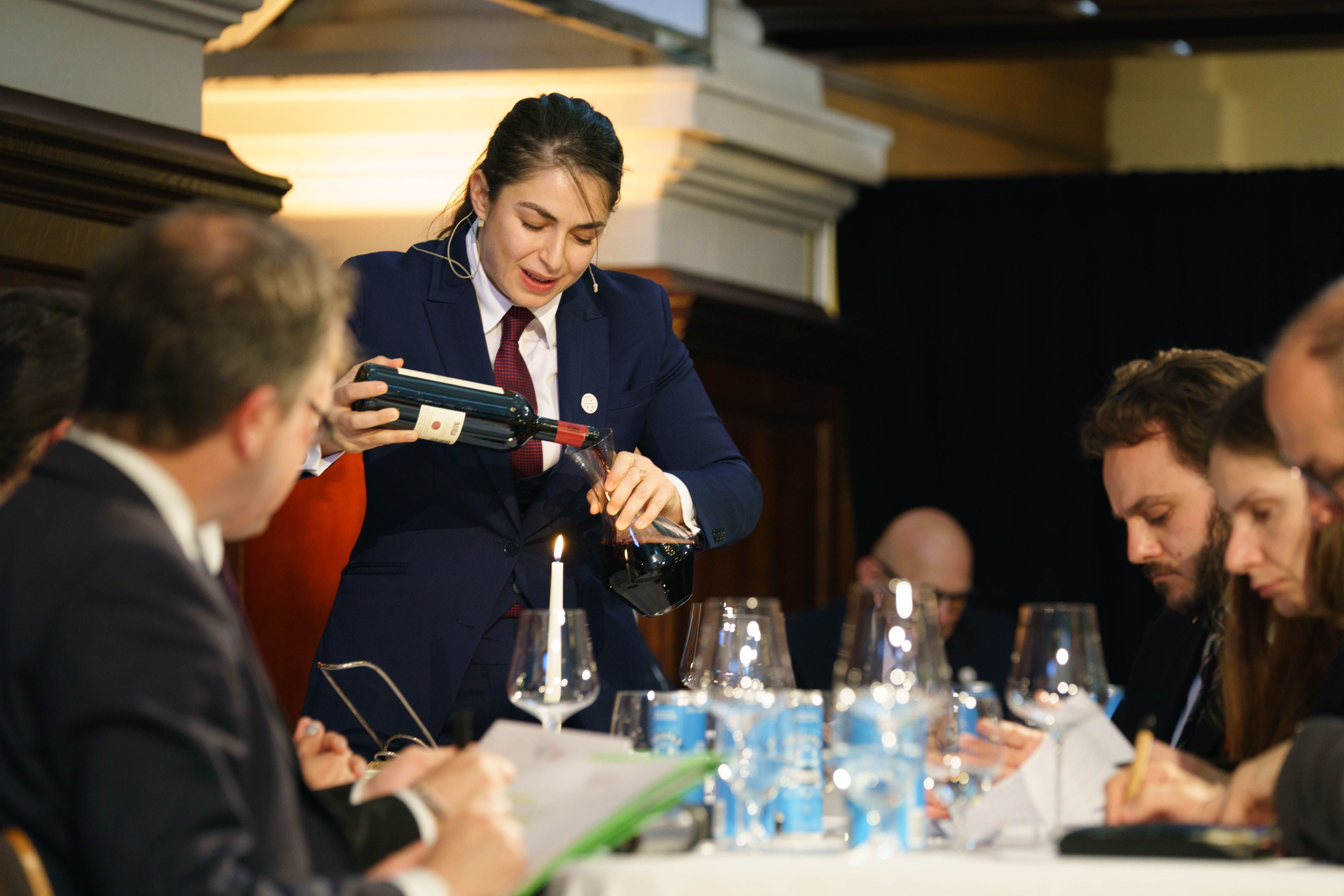Can you tell us about your background and how you got into wine and hospitality?
My background is really in hospitality. It wasn’t long after I first stepped into the restaurant world in my hometown of Thessaloniki, Greece, that I discovered there was something truly enchanting about wine.
At the time, I wasn't entirely sure what a sommelier did. To be honest, there were hardly any sommelier roles in my city back then, aside from perhaps one or two high-end restaurants that felt out of reach for most people. Still, I sensed there was so much more to the profession than simply pouring wine.
Gradually, through my experiences and my WSET courses, I found myself drawn to its depth, its heritage, and the beautiful way it brings people together.
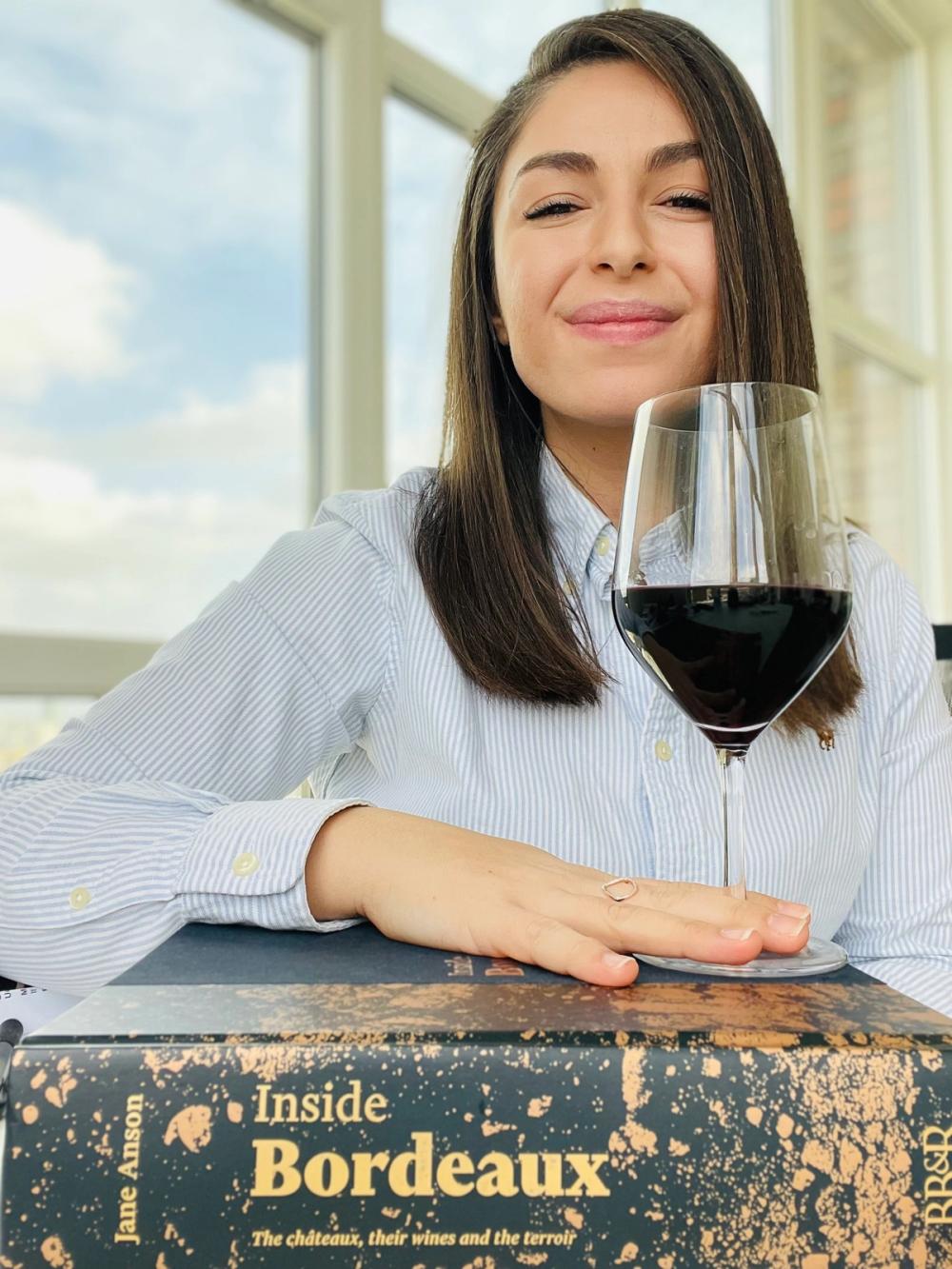
Joanna Nerantzi shares her experiences on how she became an award-winning sommelier
This curiosity led me to pack my bags the following year and move to Santorini for my first role as a sommelier. It was a privilege to serve guests from all over the world - sharing the stories behind the wines and seeing how the right pairing could turn a meal into a cherished memory.
Those moments confirmed that I wanted to take this passion further. That realisation is what brought me to the UK, where I hoped to deepen my education, learn from some of the finest sommeliers, and immerse myself in a much wider world of wine.
Why did you want to train and become a sommelier?
It really started with the magic of service. For me, there has always been something almost romantic about how wine can transform a guest’s experience from simply enjoyable to truly unforgettable. Even in my early days as a young server, my focus was always on creating moments that would linger in people’s memories.
That same desire became the heartbeat of my career as a sommelier.
Over time, I came to understand that wine is so much more than a beverage. It’s a bridge between cultures, a story preserved in a bottle, and a vessel for human connection—something guests carry with them long after they leave the table. That belief shapes how I see my role in the wider world of hospitality.
My path unfolded step by step, learning from every role and every challenge. I’ve always been deeply curious—and admittedly a little impatient—about what lies ahead. Whether it’s the next restaurant that will work for, the next wine to discover, or the next region to explore, each new step is an adventure that keeps my passion alive.
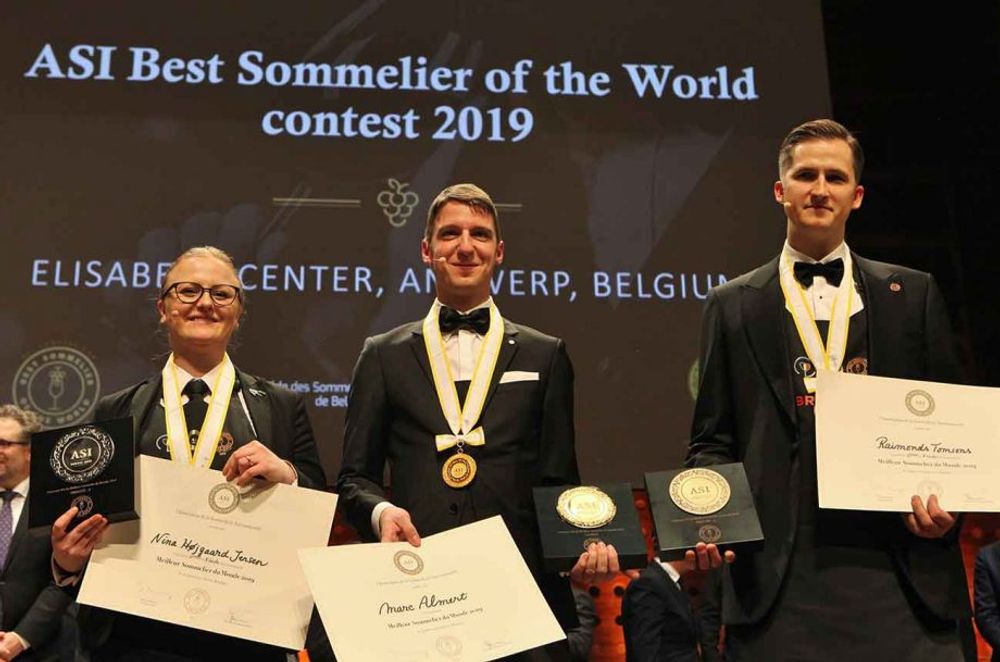
Watching the finals of the ASI Best Sommelier of the World in 2019 on a livestream was an inspiring moment for Joanna Nerantzi
I was also incredibly inspired by the masters of the industry. I remember being back in Greece and watching the livestream when Marc Almert was crowned Best Sommelier of the World in 2019. Seeing that level of dedication and knowledge was a powerful motivation. It showed me what was possible and pushed me to keep learning and growing.
What do you see as being the key skills you need to be a good sommelier?
I believe the most important skill is a mindset of genuine curiosity. I was very fortunate to start my career in London alongside some incredible professionals, and that experience taught me what truly sets a sommelier apart.
Technical skills are, of course, vital. Strong tasting abilities, quick thinking, and staying calm under pressure are invaluable on the floor. But these are skills that can be taught and honed over time.
What can’t be taught is the deeper mindset: the drive to be a constant learner, an observer, and a devoted student of wine and hospitality every single day. It requires consistency, determination, and a willingness to adapt to a demanding lifestyle.
Above all, I think the key skill is to be truly hospitable - not only to your guests, but to your colleagues as well. That humility and sense of teamwork are the foundation of everything. For me, the goal isn't just to perform a role, but to grow within it.
How have you looked to improve and hone in on those specific skills?
I’ve always approached it with the mindset of being a lifelong learner. For me, the goal is to find a lesson in every experience.
From the very beginning, I sought out challenging environments where I could learn from experienced professionals. Starting my career at a place like 67 Pall Mall in London was a formative experience, as I was constantly inspired by the high standards around me. Pushing myself to work in different settings - different London establishments - also sharpened different skills, like advanced sommelier service, anticipating guest expectations and becoming comfortable with different companies structures.
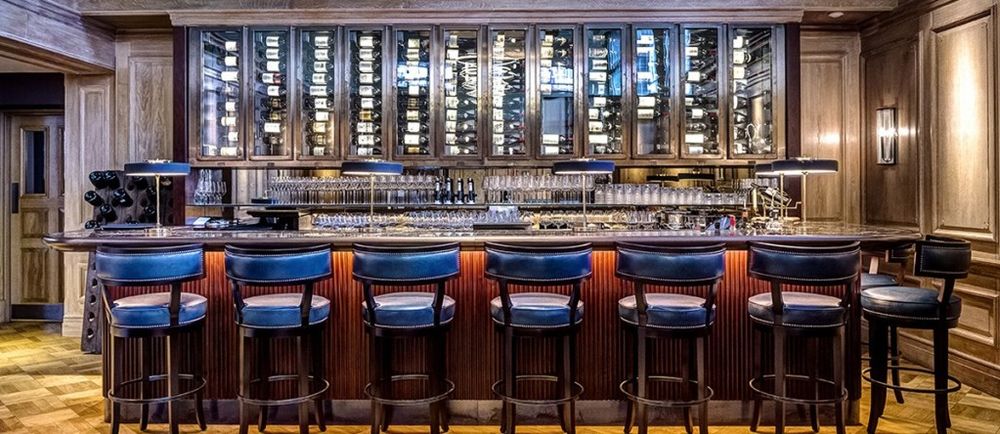
Joanna Nerantzi says her time at 67 Pall Mall was crucial in her development and learning as a sommelier
Formal education through certifications has been important, but I also find the most valuable learning happens daily. It’s in the countless hours spent reading, tasting, and, most importantly, discussing wines with colleagues and guests. I also make it a habit to seek feedback, not just from my managers, but from my teammates and even guests. Every perspective helps me refine my approach.
Ultimately, I see skill-building as a daily practice. Every service, every guest interaction, and every bottle opened is an opportunity to learn something new—not just about wine, but about people, communication, and hospitality.
What is your approach to putting together a wine list and what you see as being the key factors you need to get right?
For me, the guest experience is the absolute priority. Anyone can put together a technically "impressive" list filled with rare bottles, unheard producers but my goal is completely different. I want to create one that feels approachable and exciting for everyone, regardless of how much they know or how much they wish to spend.
A guest’s enjoyment should never depend on their ability to recite vintages or pronounce appellations flawlessly. My aim is to build a list that blends familiarity with discovery. I love featuring trusted, well-known producers alongside small, hidden gems that guests might not find elsewhere. It’s about offering something for the collector who follows critics, but also for the curious guest who is open to trying something new.
This philosophy also guides the practical details. I believe in offering all formats - half bottles, magnums, and everything above - because the right format can make an occasion feel truly special.
A generous by-the-glass selection is also essential, as it’s a wonderful way for guests to explore hidden gems without committing to a full bottle.
I try to see the list through a guest’s eyes. Whether it’s a printed menu or on a tablet, it must be clear, engaging, and inviting, never an intimidating book or list that people are afraid to open or to browse through. Every guest, whether they’re enjoying their first bottle or their thousandth, should feel comfortable, curious, and excited to explore a wine list.
Has that changed and what you need to get right in a wine list changed in the last few years?
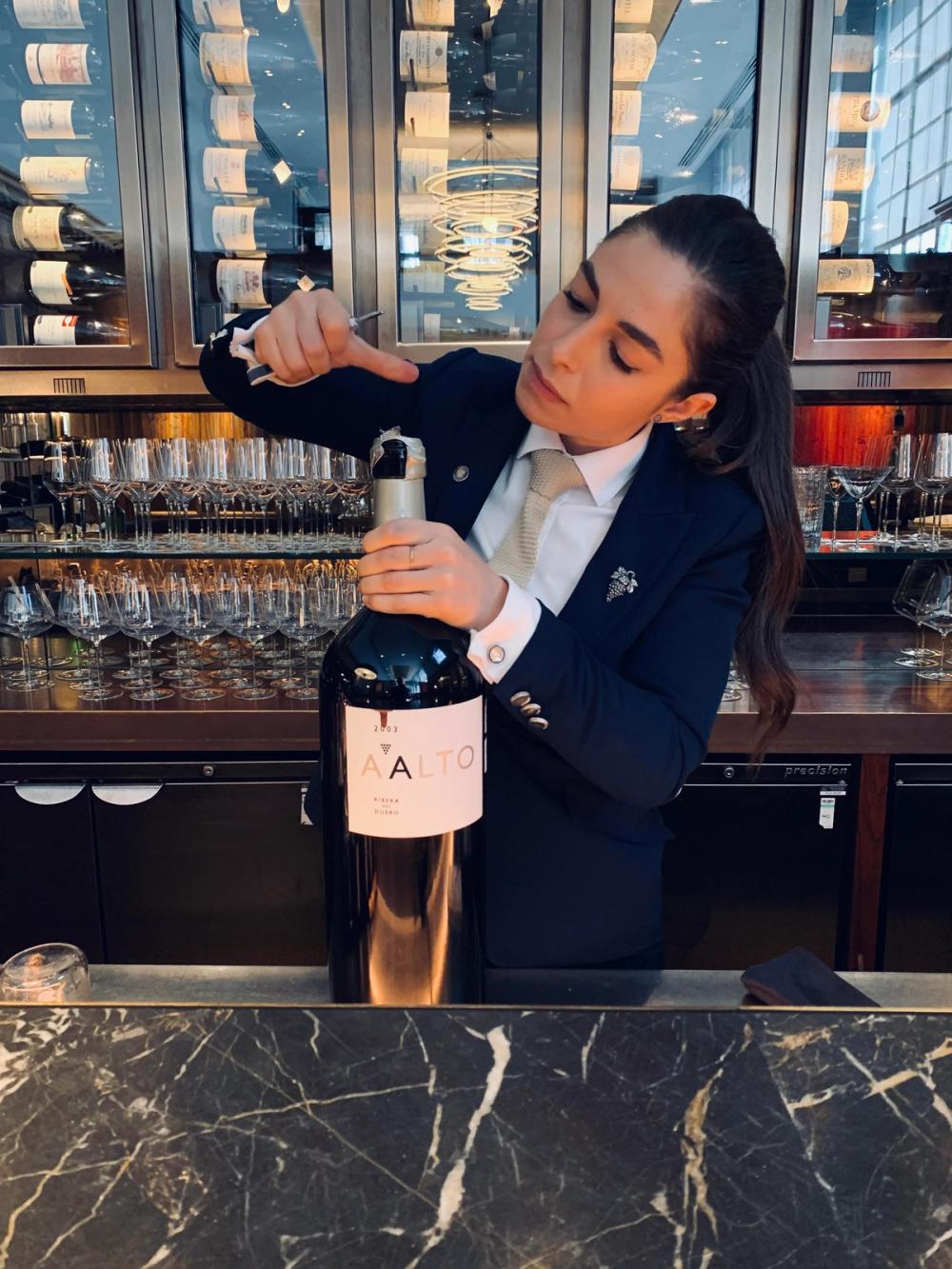
Joanna Nerantzi says a key skill of a sommelier is being able to listen and fully understand what wines your customers are looking for
Absolutely, though I would say drinking habits are evolving rather than completely changing. Many guests today are drinking less overall, but mostly drinking better.
There’s a definite shift towards lower-alcohol wines and a demand for organic and biodynamic options, even if it’s more about a general feeling of wellness than the specific technical details. People are also more budget-conscious, saving the big-name wines for special celebrations.
This creates a wonderful opportunity. Guests are more open to discovery than ever before, especially when they can find exceptional quality without a huge price tag. They get genuinely excited to find something unexpected by the glass - a Xinomavro from Greece, a Grüner Veltliner from Austria, an Albillo Mayor from Ribera del Duero, Pinot Noir from Japan or even a high-quality, non-alcoholic sparkling tea.
I hear "inspire me," or "show me something new" , ‘’something out of the box’’ far more often these days. While there will always be a place for the classic, high-end bottles, people now appreciate a list that showcases a wider variety of grapes and styles.
Ultimately, the goal is to strike the right balance between value, discovery, and comfort. But a wine list on its own is never enough. The most important factor is the human connection—having a person there to listen, share their passion, and help a guest find the perfect wine for that moment. That is the real role of a sommelier: to be present in that moments.
What is your strategy and approach to working with by the glass wines vs bottles?
The by-the-glass list is all about discovery. It’s my favourite way to introduce people to something new, a unique grape variety, a small producer, or a seasonal wine they might not have committed a full bottle to. For this to work, freshness is key, so the selection is always dynamic. It's also a team effort; I work closely with the whole service team to ensure everyone feels confident and excited to share these wines with our guests.
The bottle list is more about creating a shared experience or marking an occasion. My approach here is always a conversation. Listening to what a guest enjoys, what they're eating, and what kind of moment they're having. The goal is to guide them to a bottle that feels right, whether it’s a familiar favourite or an exciting discovery.
Sometimes, the best approach is to bridge the two. We might start with a glass, and if it’s a perfect match for the meal and the moment, we can always move to a bottle or vice versa. It’s all about being flexible and finding what makes the guest happiest. When they leave with a great memory, we’ve done our job right.
Where are you seeing the most growth in terms of wine styles, countries, regions that are most in demands?
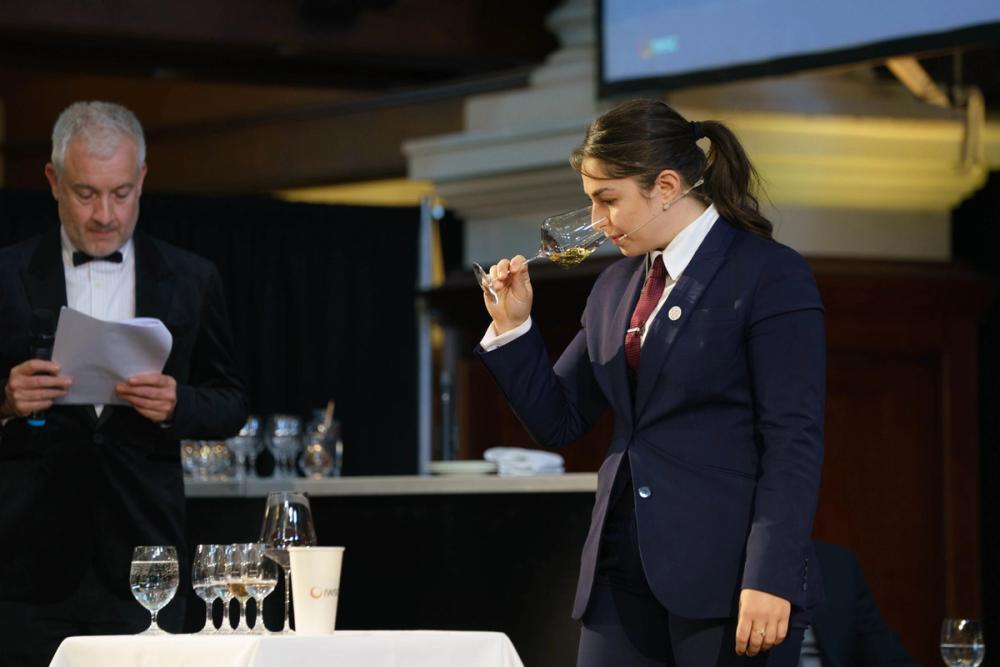
Joanna Nerantzi was a runner up in the UK Sommelier of the Year Awards 2025 now organised by IWSC
What’s most exciting right now is that guests are more adventurous and curious than ever. We're seeing a real shift towards wines that feel lighter and fresher—we're pouring a lot more chilled reds, complex rosés, and crisp, mineral-driven whites.
This often connects to an interest in how the wine is made; there's a genuine curiosity about organic, biodynamic, and low-intervention wines because people want to know the story behind what they're drinking and the way that the wine was made.
This curiosity is also leading them to explore new places. While the classic regions will always have their devoted fans and are consistently in demand, there's a huge buzz around areas that offer incredible quality and value, like Greece, Spain and Portugal and emerging regions like China, Japan and India. And of course, being here in London, the excitement for English sparkling and still wines are fantastic to see.
It’s a fascinating balance, because alongside this spirit of discovery, the love for iconic, 'superstar' producers are as strong as ever. So, the real trend is a beautiful duality: guests are thrilled to explore the new and adventurous, while still cherishing the timeless and iconic.
What do you enjoy most about being a sommelier?
For me, being a sommelier isn’t just a job; it’s a lifestyle. You get to be part of a world that is constantly evolving, which means you are always learning and growing right along with it.
My greatest passion is the energy of the restaurant floor. I enjoy the quiet, focused work of managing a cellar, but I never want to miss a service. There’s a unique vibe during service - the pace, the interactions - that is incredibly rewarding.
Connecting with a guest, even if it’s just to help them find the perfect single glass of wine, is the moment that makes my day. Of course, it comes at a price: long hours, late nights, and a lot of energy, but that human connection makes it all worthwhile.
I also love the constant journey of self-improvement that this career demands. The blind tastings with colleagues, the challenges, the exams, the travel. It’s a constant, friendly race against yourself. There’s a deep satisfaction in that quiet pursuit of becoming better at what you are doing every single day, whether that means being a little faster, more accurate, or simply more attuned to what a guest might enjoy. It's that complete immersion in the world of wine and hospitality that I truly love.
What do you look for when working with a wine supplier - what are the key criteria that makes you want to work with them?
A great supplier relationship is built on a few key pillars. It starts with an exciting portfolio; a sommelier is always looking for wines with a clear identity and a story to tell, whether that comes from a strong sense of place, sustainable farming, or a passionate producer.
Beyond the product itself, the relationship must be a true partnership, not just a transaction. The best suppliers are those who invest in a restaurant's success by offering team training, hosting tastings, organising educational events and sharing insights to help elevate the guest experience.
Finally, all of this must be supported by the fundamentals of reliability. In a busy restaurant, the team needs to depend on consistent stock, timely deliveries, and honest communication.
When a great product, a collaborative relationship, and dependable service all align, that’s when a supplier becomes an invaluable part of the team.
What are the worst and most frustrating things that wine suppliers can do to make your job difficult?
Not being a being a good business partner or understand the nature of the business.
What are the best things a wine supplier can do to make your job easier?
The best suppliers act like partners - they keep sommeliers, wine buyers informed on changes and trends, support the team with tastings and trainings, deliver reliably, and step in with smart solutions when challenges come up. That combination makes running a hospitality wine program much easier.
Any peers or mentors in the restaurant and sommelier world that have helped you along the way and how?
It has always been my dream to work with and learn from the very best in this industry, and I feel incredibly privileged to have had that opportunity. I would love to mention a few of the talented people who have truly shaped my journey.
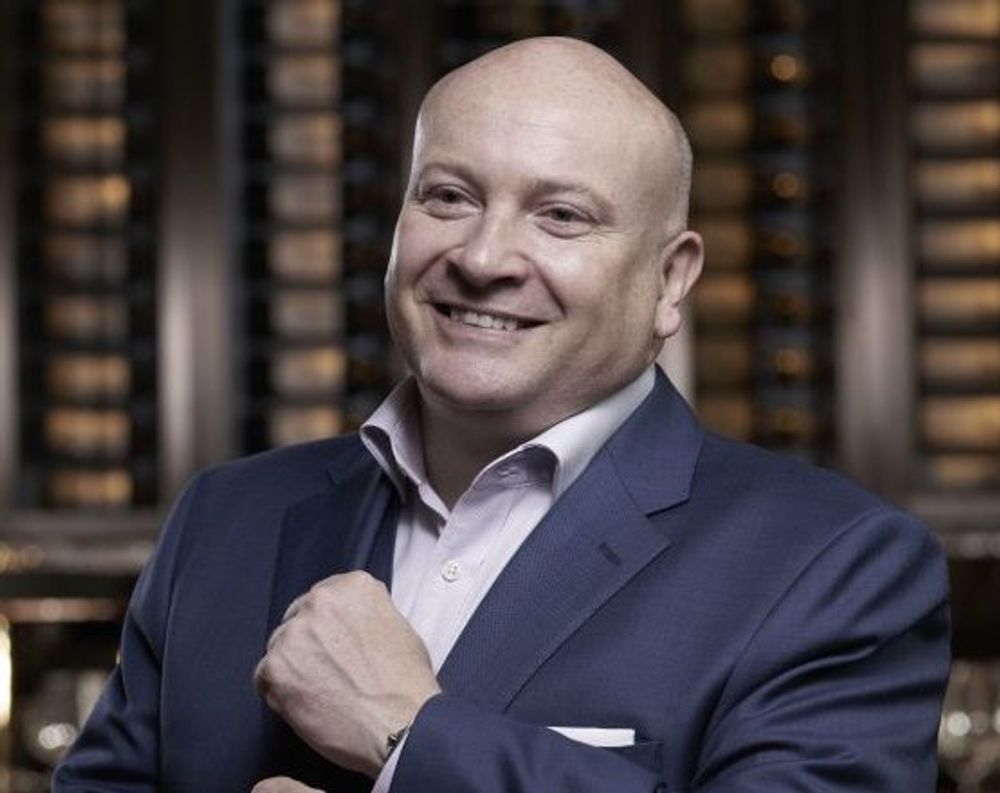
Joanna Nerantzi says Ronan Sayburn MS has been a big influence on her career thanks to "his professionalism and humility" which "helped me define the kind of sommelier I wanted to become"
Ronan Sayburn MS was a pivotal figure for me. I met him as a junior sommelier at 67 Pall Mall, and his professionalism and humility helped me define the kind of sommelier I wanted to become, which is one of the most important decisions in this career.
Terry Kandylis is the person who first opened the door for me in London, giving me the space and encouragement to pursue my goals. He has been a constant source of inspiration ever since.
I also learned so much from Roberto Duran MS. Working alongside him from my early days, he taught me about the focus, discipline, and mindset required to perform at a high level consistently.
While I haven't had the chance to work with her directly, Kathrine Larsen MS has been a powerful mentorship figure for me from afar. I’ve followed her career for many years, and her achievements are a constant source of inspiration.
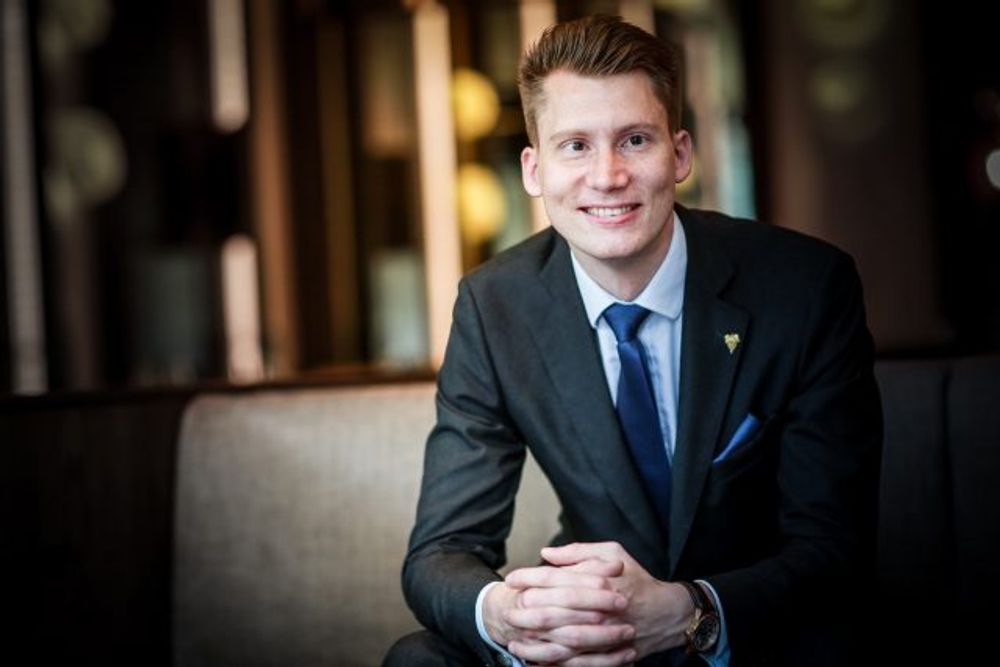
Stefan Nuemann MS has been an important figure in Joanna Nerantzi's career
Matteo Montone MS has shown me what true leadership in hospitality looks like—how to run a wine program with a blend of excellence, consistency, and innovation.
Stefan Neumann MS, whose incredible dedication to training the next generation of sommeliers in the UK, inspires so many of us - including me - to keep learning and, most importantly, to pass that knowledge on to others.
Finally, Quenna Wong. Her tireless passion and dedication to supporting and uplifting the female wine community here in the UK are truly remarkable. Seeing her actively work to build a more inclusive and equitable environment is incredibly motivating. It’s a powerful reminder of the importance of community and the positive impact we can have when we support each other.
What do you find the hardest or the most challenging and how have you overcome them?
There have been two significant challenges for me both belong in the past. On a professional level, building a career as a woman in what has traditionally been a very male-dominated environment requires an extra layer of resilience and determination.
When I was starting out, I often felt an unspoken pressure to work harder, study more, and be more precise than my male colleagues, simply to prove my knowledge and earn the same level of respect. It meant ensuring I was always prepared, whether for a challenging service or a technical question from a guest or colleague.
Later, as I started to grow into leadership positions, I faced even more pronounced pressure, especially when I had to lead teams of male colleagues or to position myself next to colleagues older than me or who were in the industry longer.
It’s a reality many women in this industry have faced, and navigating it taught me the importance of being confident in my skills, seeking out supportive mentors, and building a strong network of peers.
On a more personal level, the greatest challenge I faced was burnout. The sommelier path is incredibly demanding. For a few years, I was working extremely long hours on the floor while studying intensively in my free time. The pressure just kept building; unlike many careers that get easier with experience, this path often becomes more demanding as you progress.
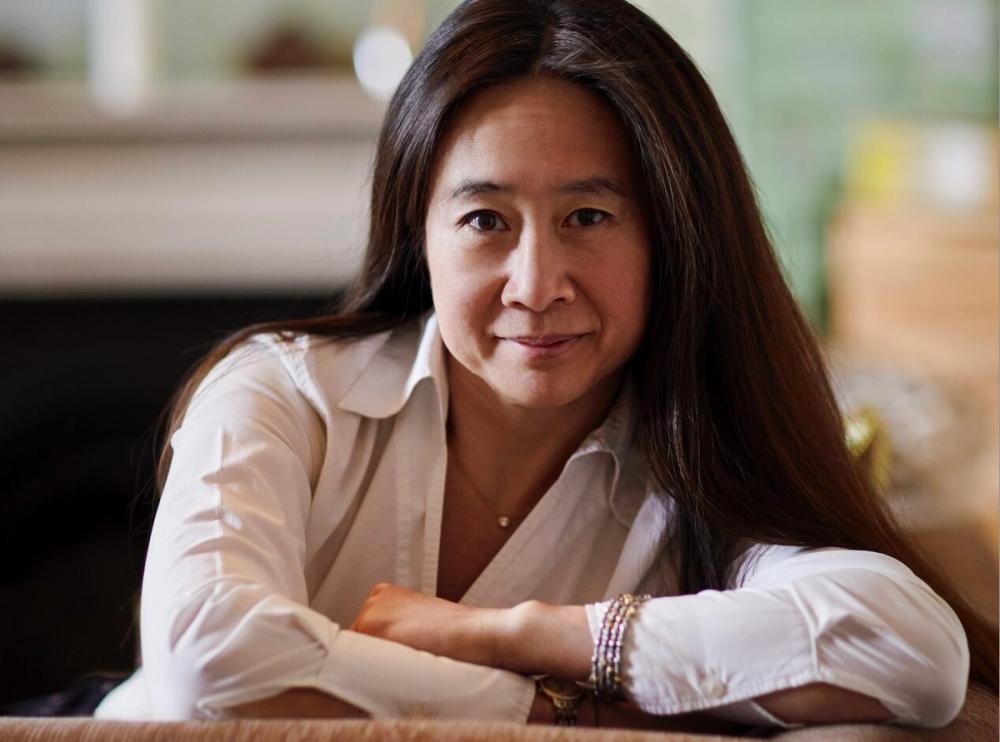
Queena Wong and what she is doing to promote and support women in the wine industry has been inspiring for Joanna Nerantzi
I eventually reached a point where I wanted to quit entirely - change professions and leave it all behind. The breaking point, ironically, came just after I had passed the very demanding Advanced Sommelier exam. I had achieved this huge goal, but my personal motivation was gone.
To regain my balance, I knew I had to make a change. I stepped away from a pure sommelier role for a year and worked as restaurant floor manager in a Japanese restaurant. That distance gave me the perspective I needed to reflect on the life in wine that I truly wanted. It also allowed me to develop new skills in business and leadership, which ultimately made me a more well-rounded professional when I returned.
In the end, I overcame the burnout by reconnecting with my "why I chose this career.” I realised that the restaurant floor is where I belong, that training other sommeliers is deeply fulfilling for me, and that creating memorable experiences for guests is what truly inspires me.
That year transformed my approach. I returned with renewed energy and a deeper understanding that while passion is crucial, it's resilience, adaptability, and self-awareness that truly sustain a long and happy career in this industry.
What have been your career highlights?
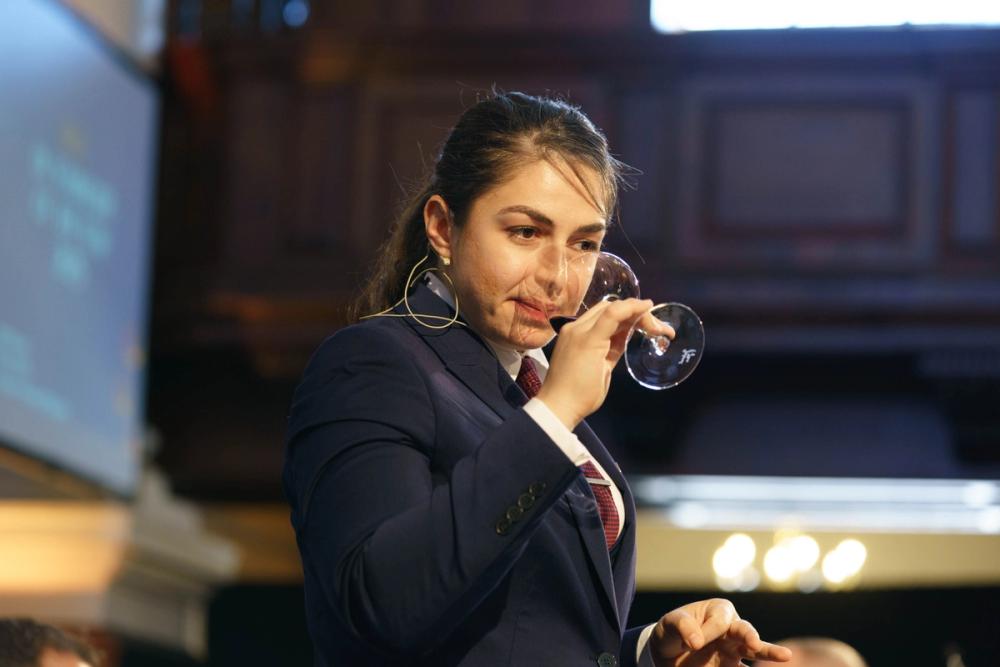
From watching a livestream of the 2019 world sommelier finals to being runner up in the UK Sommelier of the Year awards is clearly a major career highlight for Joanna Nerantzi
Working at 67 Pall Mall was, with no doubt, one of the defining experiences of my career - it was my personal wine university. It was a place that challenged me daily, expanded my knowledge beyond what I had imagined, and surrounded me with some of the most talented professionals and guests in the industry. There hasn’t been a single day since I left that I haven’t missed it.
Another proud milestone was passing the Advanced Sommelier Examination with the Court of Master Sommeliers Europe in 2023—a goal that required years of preparation, discipline, and resilience and currently is being hold by 524 people.
Most recently, I was incredibly honoured to place third in the UK Sommelier of the Year 2025 competition. It was a humbling experience to be tested and judged by some of the leading figures in the UK and global wine scene. More than the result itself, the highlight was standing alongside such skilled and passionate professionals. That sense of community was deeply motivating and reinforced my commitment to keep growing in this career.
Anything else to say?
Thank you so much again for your time and interest in my career.
* If you would like to share your story on being a sommelier then please contact Richard Siddle on richardsiddle5@gmail.com.
